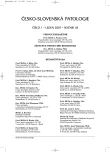Assessment of Sentinel Nodes in Breast Cancer by Rapid Peroperative Biopsy and Immunohistochemistry in Serial Sectioning
Vyšetření sentinelových uzlin u karcinomu prsu pomocí rychlé peroperační biopsie a imunohistochemie v sériových řezech
Jsou uváděny výsledky histologického vyšetření sentinelových lymfatických uzlin (SLN) u karcinomu prsu metodou rychlé peroperační biopsie ze zmrazených řezů. Popisujeme první zkušenosti ze souboru 77 pacientek, řešených v období březen 2005 – červenec 2006 záchovným resekčním výkonem s peroperační biopsií axilárních sentinelových uzlin a v případech negativního nálezu pak následným zpracováním bloků v sériových řezech za použití imunohistochemie. Našim cílem bylo ověřit, jaké množství metastáz zachytíme v průběhu samotné peroperační biopsie (senzitivita) a jaký je poměr negativních nálezů s pozitivitou v následném sériovém zpracování k celkovému množství peroperačně negativních nálezů (falešná negativita). Získané výsledky jsou porovnány s recentně publikovanými pracemi. Krátce je diskutována náročnost a možnosti zvolené metody. V souboru 77 pacientek s karcinomem prsu bylo vyšetřeno celkem 193 SLN, medián 2,5 (rozmezí 1–7 uzlin). Po kompletním vyšetření byly sentinelové uzliny negativní ve 45 případech (58,4 %). Ve 32 případech bylo zjištěno metastatické postižení SLN (41,6 %), z toho peroperačně jsme zjistili metastázu ve 24 případech, to je 75%senzitivita. Specificita je přitom 100%. V 8 dalších případech byly zjištěny metastázy až v následném sériovém zpracování bez nebo s použitím imunohistochemie – falešná negativita 15,1%. Ve všech případech se jednalo o mikrometastázy, nebo izolované nádorové buňky (ITC) a buněčné klastry.
Klíčová slova:
karcinom prsu – sentinelová uzlina – metastáza – peroperační biopsie
Authors:
P. Vážan 1; J. Velecký 1; J. Gatěk 2
Authors‘ workplace:
Bioptická a cytologická laboratoř, pracoviště Zlín
1; Oddělení chirurgie, Nemocnice ATLAS a. s., Zlín
2
Published in:
Čes.-slov. Patol., 43, 2007, No. 1, p. 13-17
Category:
Original Article
Overview
Results of histological examinations of sentinel lymphatic nodes (SLN) obtained by rapid peroperative biopsy (RPB) are presented. Our first experience with 77 patients undergoing localized excision of axillary sentinel nodes is reported. Negative nodes were subsequently examined by means of immunohistochemistry of serial sectioned blocks. The aim of the study was to verify the percentage of identified metastases, and thus define the reliability of the RPB. At the same time we tried to determine the ratio of the negative biopsies of SLN, which were found positive subsequent to immunohistochemistry examination of serial sections, to the total amount of peroperative negative findings or a “false negativity”. Our results were compared with those recently published. Particular demands and possibilities of the method used are briefly discussed. In the group of 77 patients with breast cancer, the total number of 193 SLN were examined (average 2.5, in a patient ranging from 1 to 7). Out of all examined SLN, 45 patients (58.4%) were negative. Metastases were identified in 32 patients (41.6%). By rapid preoperative biopsy alone, metastases were found in 24%, which represents 75% sensitivity. The specificity was 100%. The following examination of serial sectioned specimens with or without immunohistochemistry showed 8 more patients with metastases, which represents the false negativity of 15.1%. The metastases found in all 8 patients were small micrometastases, isolated tumour cells or clusters of cells.
Key words:
breast carcinoma – sentinel lymph node – metastasis - intraoperative frozen-section biopsy
Labels
Anatomical pathology Forensic medical examiner ToxicologyArticle was published in
Czecho-Slovak Pathology

2007 Issue 1
-
All articles in this issue
- Cardiovascular Pathology – New Informations
- Assessment of Sentinel Nodes in Breast Cancer by Rapid Peroperative Biopsy and Immunohistochemistry in Serial Sectioning
- Perivascular Epithelioid Cell Tumor (PEComa) of the Liver: a Case Report and Review of the Literature
- Primary Hodgkin Lymphoma of the Stomach – a Case Report
- Cutaneous Sarcoidosis during Pegylated Interferon alpha and Ribavirin Treatment of Chronic Hepatitis C – a Case Report
- Pathology and Eschatology
- Czecho-Slovak Pathology
- Journal archive
- Current issue
- About the journal
Most read in this issue
- Primary Hodgkin Lymphoma of the Stomach – a Case Report
- Perivascular Epithelioid Cell Tumor (PEComa) of the Liver: a Case Report and Review of the Literature
- Assessment of Sentinel Nodes in Breast Cancer by Rapid Peroperative Biopsy and Immunohistochemistry in Serial Sectioning
- Cardiovascular Pathology – New Informations
